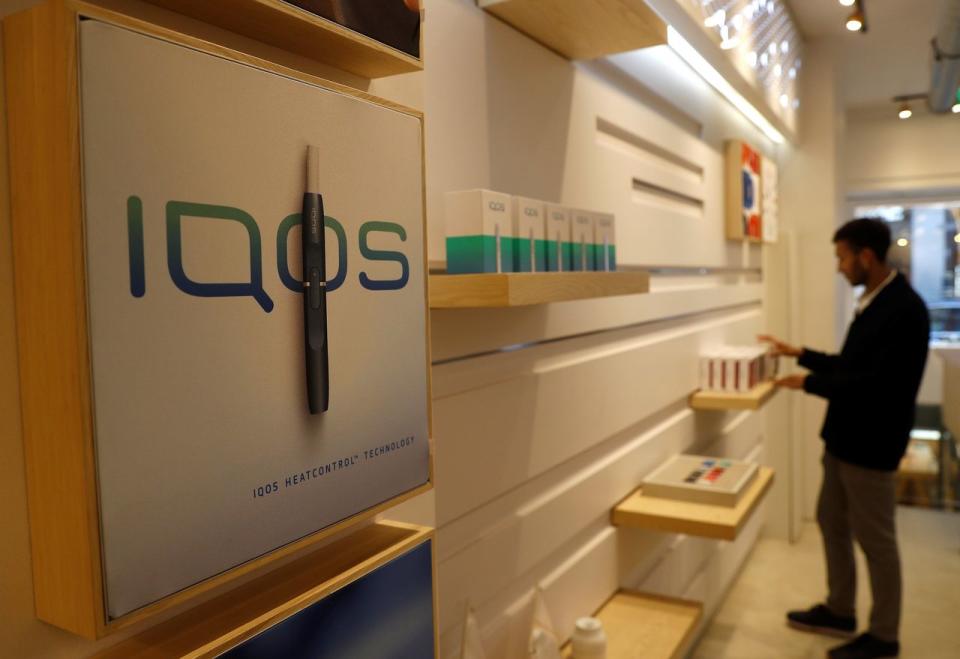America’s Cigarette Market Is Up for Grabs
America’s original Marlboro Man faces a fresh competitor, who also happens to be a Marlboro Man. The showdown between them will reshape the U.S. tobacco market.
Most Read from The Wall Street Journal
FAA, United Investigate Cockpit Visitor During Baseball Team’s Flight
Netflix Password Crackdown Delivers Millions of New Customers
When Philip Morris International was spun out of Marlboro maker Altria in 2008, the two companies were never expected to compete head on. PMI’s job was to distribute America’s bestselling cigarette brand overseas, while Altria would continue to sell it at home. But PMI gate-crashed the U.S. market 16 months ago through its $16 billion takeover of Zyn oral nicotine-pouch maker Swedish Match.
In roughly a week’s time, the last commercial tie between Altria and PMI will be severed. A 2013 contract that gave Altria the exclusive U.S. distribution rights to PMI’s most successful smoke-free product, IQOS heat-not-burn tobacco sticks, expires on April 30. After this date, PMI will be free to compete in the U.S. with its top noncigarette brand for the first time.
Relations between the two companies have been tetchy for years. In 2019, they stunned investors by announcing plans to remerge. PMI’s shareholders in particular hated the idea, and the stock fell. The deal was ultimately scrapped, causing tension. Then, in 2021, PMI began to complain publicly about how slowly Altria was rolling out IQOS in America. The Swedish Match deal followed soon after and turned the companies into direct rivals.
PMI hopes that by rolling out IQOS, it can grab a 10% share of the lucrative U.S. cigarette and heated-tobacco market by roughly 2030. The potential prize is enormous—an additional $2.2 billion in annual earnings before interest, taxes, depreciation and amortization, according to Stifel analysts. Altria, with its 50% share of the American cigarette market, has a lot to lose if PMI can persuade more smokers to switch to noncombustible alternatives.
America’s tobacco market is ripe for further disruption because smokers are changing how they get their fix. Last year, 40% of all nicotine products sold in the U.S. were smoke-free. This includes categories like e-cigarettes and oral nicotine pouches. Traditional cigarettes make up the remaining 60%, down from 80% in 2018. If the trend continues, Americans will be more likely to reach for a vape or nicotine pouch than a cigarette within three years.
PMI looks in a stronger position to exploit the trend. The company already makes around 40% of its net revenue from smoke-free products. And it doesn’t need to worry about the dwindling number of U.S. smokers because PMI doesn’t sell cigarettes in America.
Altria does have a small share of the smoke-free market. The company owns brands including on! oral nicotine pouches and NJOY e-cigarettes. It also has a joint venture with Japan Tobacco to launch Ploom heated tobacco sticks in the U.S. and is working on its own heat-not-burn brand. But Altria still relies on old-school smokes for more than 85% of its sales for now.
PMI has proved to be a more innovative company. The $12.5 billion it poured into creating IQOS since 2008 produced a brand that now generates more than $10 billion in annual sales. Altria’s record has been rockier. A badly timed bet on e-cigarette brand Juul Labs saddled the company with a $12.5 billion loss. Altria recently sold part of its stake in Budweiser brewer Anheuser-Busch InBev and will use the proceeds to buy back its own stock. That money may be better spent investing more heavily in smoke-free products.
But Altria has several home advantages it can use to slow PMI’s march. Its U.S. distribution muscle is very strong. It can hog the best shelf space, thanks to relationships built up with retailers over decades. In most U.S. convenience stores, Altria dominates the banner ads over the cigarette cabinet. This is a considerable perk as the point of sale is one of the few places where tobacco companies are allowed to advertise their brands.
Altria can also harness data to defend its patch. The tobacco giant is integrated into many retailers’ loyalty programs, allowing it to monitor what shoppers are buying. If Altria sees that a smoker is experimenting with cigarette alternatives like vapes, it can send the customer coupons or promotions for Altria’s smokeless brands.
None of this will keep PMI at bay forever, but it would buy Altria some time to improve its own smoke-free offer. And if Americans are slow to adopt IQOS, which is a new type of nicotine product in the U.S., Altria will have more opportunity to catch up. Management wants noncombustible products to generate $5 billion by 2028, which will represent around 25% of total sales.
Importantly for investors, expectations for Altria are so low that any good news could make a difference to its stock. The shares trade at eight times projected earnings, while PMI’s fetch 14 times. Altria would get a boost if the U.S. Food and Drug Administration cracked down on illicit disposable vapes imported from China that are currently capturing all the growth in America’s e-cigarette market.
PMI has a stronger portfolio of smoke-free brands and American smokers seem in the mood to experiment. But the company won’t get a warm welcome from its former parent. PMI can expect plenty of blocking tactics as Altria fights to defend its territory.
Write to Carol Ryan at carol.ryan@wsj.com


